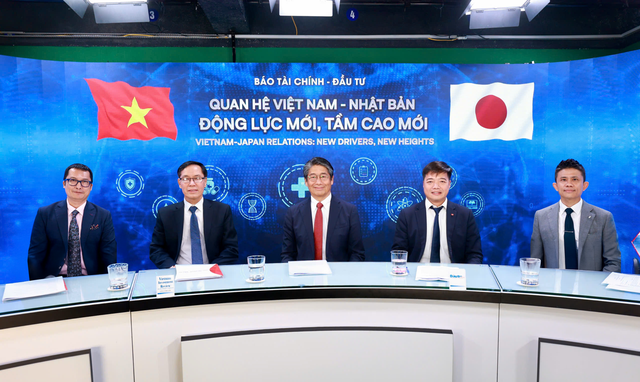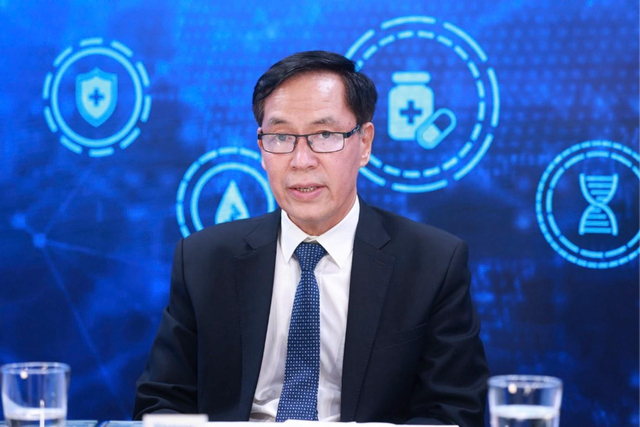Viet Nam, Japan expand strategic pillars toward healthcare sustainable development
VGP – Healthcare has been identified as one of the key pillars in the Viet Nam-Japan relations, reflecting the trust, sustainability, and shared focus on human development.

Speakers at the seminar include Director General of the Department of International Cooperation under the Ministry of Health Dang Quang Tan (2nd from L), Japanese Ambassador to Viet Nam Ito Naoki (3rd from L), and General Director of Takeda Viet Nam Benjamin Ping, Ha Noi, October 15, 2025 - Photo: VGP/Vinh Hoang
Japan is committed to continuing to accompany Viet Nam in fundamental sectors such as healthcare, education, and science and technology — essential elements that create long-term value for people and society, said Japanese Ambassador to Viet Nam Ito Naoki.
The Ambassador made the point at a seminar themed Viet Nam–Japan Relations: New Momentum, New Heights" organized by the Investment Review on the occasion of the 52nd anniversary of diplomatic relations between Viet Nam and Japan (1973–2025) on October 15 in Ha Noi.
Accordingly, high-level speakers discussed the strategic cooperation orientation between the two countries in the new era, in which healthcare is considered a top priority.
The event drew the attendance of Director General of the Department of International Cooperation under the Ministry of Health Dang Quang Tan, Deputy Director General of the Department of Foreign Investment under the Ministry of Finance Nguyen Anh Tuan; and General Director of Takeda Viet Nam Benjamin Ping.

Director General Dang Quang Tan at the seminar - - Photo: VGP/Vinh Hoang
Long-standing strategic partners in healthcare
Dang said that Japan is one of Viet Nam's long-standing strategic partners in healthcare. The partnership is founded in the Memorandum of Cooperation in the Health Sector signed in 2019 between the Vietnamese Ministry of Health and the Japanese Ministry of Health, Labor and Welfare.
So far, many key cooperative projects have been implemented, focusing on three pillars namely (1) developing modern healthcare infrastructure, (2) advancing medical equipment, and (3) building human resource capacity.
Notable projects included the project titled "Strengthening capacity development system for health workers through telemedicine" implemented by the Ministry of Health in cooperation with the Japan International Cooperation Agency (JICA), with a total investment of about US$3 million; and the Project for Improving the Prevention and Control of Viral Hepatitis in Viet Nam between the Department of Preventive Medicine and JICA. These projects have yielded positive outcomes in disease control and treatment in Viet Nam.
Viet Nam's healthcare development strategy in the coming years will be based on innovation, high technology application, improved service quality, and international integration, Dang added.
Viet Nam encourages Japanese enterprises to share experiences and transfer technology in pharmaceuticals, medical devices, food safety, traditional medicine, and hospital management.

Japanese Ambassador to Viet Nam Ito Naoki - - Photo: VGP/Vinh Hoang
Promoting Public–Private Partnership in healthcare innovation
Participants agreed that public–private partnership (PPP) models are becoming an important approach in building a sustainable healthcare system in Viet Nam.
Ambassador Ito Naoki highly valued the contribution of Japan's private sector in this field.
"Japanese enterprises not only bring investment capital but also share experience, technology, and advanced management processes, directly contributing to improving healthcare quality for the Vietnamese people", he said.
He cited the case of Takeda Group, a leading Japanese company active in Viet Nam's healthcare sector.
Takeda has developed the first dengue vaccine licensed for use in Viet Nam — a significant milestone in infectious disease prevention.

General Director of Takeda Viet Nam Benjamin Ping - Photo: VGP/Vinh Hoang
Toward a preventive and universal healthcare system
Mr. Benjamin Ping, General Director of Takeda Viet Nam, stated that the company remains steadfast in its philosophy of "Putting patients first," focusing on rare diseases, oncology, neuroscience, plasma-derived therapies, and vaccines.
From 2021 to 2024, Takeda, in collaboration with Japan's National Center for Global Health and Medicine (NCGM) and the Ho Chi Minh City Society of Asthma – Allergy – Clinical Immunology (HSAACI), launched an initiative to strengthen the diagnosis and treatment capacity for Hereditary Angioedema (HAE) — a rare disease.
So far, the initiative has organized over 70 seminars, discussions, and training courses, benefitting 7,500 healthcare professionals, screening over 100 suspected cases, and accurately diagnosing 35 HAE patients. Two specialized treatment centers have been established in Ha Noi and Ho Chi Minh City, expanding access to care for patients.
In 2024, Takeda's dengue vaccine was officially approved by Viet Nam's Ministry of Health, becoming the first licensed dengue vaccine in the country. To date, the vaccine has been approved in 41 countries, with over 20 million doses distributed globally.
Mr. Benjamin Ping said that the successful rollout of the dengue vaccine in Viet Nam is not only a result of bilateral cooperation but also contributes to the World Health Organization's (WHO) global goal of eliminating dengue-related deaths by 2030.
The extensive cooperation in healthcare stands as a vivid testament to the increasingly substantive Comprehensive Strategic Partnership between Viet Nam and Japan.
Through technical assistance, technology transfer, and human resource training, Japan is helping Viet Nam build a robust, resilient healthcare system better equipped to respond to global health challenges.
As Viet Nam implements Resolution No. 72-NQ/TW on a number of breakthrough solutions to strengthen the protection, care, and improvement of people's health carries special significance, the cooperation with Japan, one of the world's leading healthcare nations — will serve as a crucial driving force for Viet Nam to achieve comprehensive healthcare.
The Viet Nam–Japan partnership in healthcare not only improves the quality of health services for the people but also embodies the strategic vision and profound humanistic values of the bilateral relationship — together striving for "development for the people, for health, and for a prosperous shared future"./.
